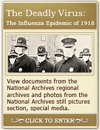Press Release: January 25, 2012
National Archives at Kansas City
Crime Exhibit opens at the National Archives at Kansas City
For More Information Contact:
Dee Harris, 816-268-8086
Kansas City, (MO)…"Theyr’e Not Going to Get Me:" Crime in the 1930s, a new exhibit at the National Archives at Kansas City, traces the rise and fall of the bank robbers and gangsters who became national icons in the 1930s. Named as public enemies, they became a target of J. Edgar Hoover’s Federal Bureau of Investigation and the impetus for a national war on crime.
The rise of this new generation of gangsters, reminiscent of the bygone days of Jesse James, the Dalton Boys, and Butch and the Sundance Kid, came at a time when the nation was looking for an escape from the poverty of the Great Depression. Inspired by dime novels, movies, and legend, these new bandits did not ride horses and wield six-shooters–they escaped in Ford V-8s as sub-machine gun fire filled the air.
While many of these criminals thought they could stay one step ahead of the law, historical documents tell a different story. Drawn from the holdings of the National Archives at Kansas City, the exhibit features original records relating to the exploits and capture of notorious criminals, their gang members, and girls; including Pretty Boy Floyd, Machine Gun Kelly, Bonnie and Clyde, John Dillinger, Baby Face Nelson, and the Barker-Karpis Gang.
Visitors will encounter original records that trace the investigation and prosecution of these criminals and their associates: indictments, verdicts, wanted posters, prison records, arrest warrants, subpoenas, parole reports, photographs, and maps. Featured documents and artifacts include the:
- grand jury indictment of Adam Richetti for the Kansas City Massacre, a 1933 shootout with local and Federal authorities at Kansas City’s Union Station;
- Leavenworth Federal Penitentiary inmate register showing George "Machine Gun" Kelly’s transfer to Alcatraz Federal Penitentiary;
- verdict against George and Kathryn Kelly in the Charles Urschel kidnapping case;
- grand jury indictment of John Dillinger;
- bench warrant and mugshot for Homer Van Meter, Dillinger gang member;
- verdict against Evelyn "Billie" Frechette, John Dillinger’s girlfriend;
- letters written by Minnesota banker Edward Bremer to his father and wife after being kidnapped by the Barker-Karpis gang;
- commitment form sending Alvin Karpis to jail for kidnapping Hamm’s Brewery chairman William Hamm; and
- witness statement signed by Melvin Purvis, Special Agent in Charge of the Federal Bureau of Investigation’s Chicago office.
"They’re Not Going to Get Me:" Crime in the 1930s will be on display at the National Archives at Kansas City from February 7 through August 18, 2012.
The National Archives at Kansas City is one of 13 facilities nationwide where the public has access to Federal archival records. It is home to more than 50,000 cubic feet of historical records dating from the 1820s to the 1990s created or received by nearly 100 Federal agencies. Serving the Central Plains Region, the archives holds records from the states of Iowa, Kansas, Minnesota, Missouri, Nebraska, North Dakota, and South Dakota. The facility is located at 400 West Pershing Road, Kansas City, MO 64108. It is open to the public Tuesday - Saturday from 8 a.m. to 4 p.m. for research, with the exhibits open from 9 a.m. to 5 p.m. For more information, call 816-268-8000 or visit us online.
# # #
LPM/LE-KC 12-10
